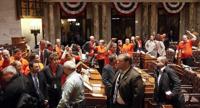Support Local Journalism
Your membership makes our reporting possible.
{{featured_button_text}}
Early on, the “tools” provided in Act 10 — namely limits on collective bargaining and increased employee contributions toward health care and pensions — did allow school districts to weather the initial hit they took to their sources of revenue.
An analysis by the Wisconsin Taxpayers Alliance (now the Wisconsin Policy Forum) showed that in 2012, the first full year after Act 10, Wisconsin school districts collected $451 million less than they did in 2011, but that the increased contributions from workers allowed districts to absorb the entire amount.
State economy has lagged
While Republicans have long maintained lower tax rates boost economic growth, Reschovsky said tax rates have played a minor role in determining growth and that businesses look for things beyond taxes, such as services, a well-functioning government and good education system.
Walker fell short of his own campaign pledge to create 250,000 new private-sector jobs by the end of his first term in office. Employers had managed to create 233,101 private-sector jobs by the end of his second term, in 2019, still short of the goal.
Assembly Democrats, in orange shirts, shout “Shame!” after GOP leaders cut off debate, move to abruptly pass the bill and walk out Feb. 25, 2011.
Since Act 10 was passed, Wisconsin’s economic growth has generally lagged behind both the nation and other Great Lakes states.
Between 2009 and 2019, Wisconsin’s GDP grew 42.3%, lagging behind U.S. GDP growth over that period of 48.3% and 42.6% for the Great Lakes region. Neighboring Minnesota’s economy grew by 47.3% during that same period.
